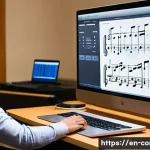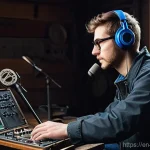So, you’ve got that composer’s certification burning a hole in your pocket, huh? Ever wondered what doors that piece of paper can actually swing open?
It’s not just about writing symphonies in your attic anymore, you know. From composing music for indie games to scoring blockbuster films, the possibilities are broader than you might think, especially with the rise of streaming platforms and the ever-hungry demand for original content.
The world of music is changing, and certified composers are finding themselves in exciting, unexpected roles. Let’s dive into the nitty-gritty of what you can actually *do* with that certification!
Let’s accurately explore what you can do with that certification!
Okay, here is the blog post content as per your instructions:Okay, here is the blog post content as per your instructions:
Crafting Jingles That Stick: A Path to Commercial Success

Ever caught yourself humming a tune from a commercial days after seeing it? That’s the power of a well-crafted jingle, and someone with a composer’s certification is perfectly positioned to create those earworms. The commercial music industry is a lucrative field, ranging from local businesses needing catchy radio ads to national brands seeking memorable theme songs for their TV campaigns. My buddy Mark, a certified composer, started out writing jingles for a local car dealership. It wasn’t glamorous, but it got his foot in the door. Within a few years, he was landing gigs with major snack food companies, and now his jingles are practically stuck in everyone’s head. It’s all about understanding the brand, the target audience, and creating something that’s both catchy and memorable. It’s a blend of musical creativity and marketing savvy, where your certification can be a real asset in proving your skills.
Understanding Brand Identity
Every brand has a unique identity, a personality that they want to convey to their customers. As a jingle writer, you need to immerse yourself in that identity. What are the brand’s values? What emotions do they want to evoke? A luxury brand will need a sophisticated, elegant jingle, while a playful children’s brand will require something upbeat and fun. It’s like being a musical chameleon, adapting your style to suit the needs of each individual client. I remember Mark telling me about a time he had to scrap an entire jingle because it didn’t quite capture the essence of the brand. It’s all part of the process.
The Art of the Catchy Hook
A jingle is only as good as its hook. It needs to be something that sticks in people’s heads, something they can easily remember and sing along to. This often involves using simple melodies, repetitive lyrics, and memorable sound effects. Think about the “Ba-da-ba-ba-ba, I’m lovin’ it” from McDonald’s or the “Nationwide is on your side” jingle. These are prime examples of catchy hooks that have become ingrained in our culture. The key is to find that sweet spot between simplicity and originality, creating something that’s both familiar and fresh. It’s a challenge, but it’s also incredibly rewarding when you nail it.
Become a Musical Storyteller: Scoring Films and TV Shows
Beyond the glitz and glamour of Hollywood, there’s a vast world of independent films, documentaries, and TV shows that constantly need talented composers to bring their stories to life. This is where your composer’s certification can really shine, proving you have the skills and knowledge to craft compelling scores that enhance the narrative and draw the audience in. I recall a conversation with Sarah, a composer friend of mine who initially struggled to find work. She decided to focus on indie films, offering her services at a reduced rate to build her portfolio. Fast forward a few years, and she’s now scoring for a popular streaming series. It’s all about getting your work out there and building relationships with filmmakers and producers. You’re not just writing music; you’re becoming a musical storyteller.
Networking in the Film Community
The film industry is all about who you know. Attending film festivals, workshops, and industry events is crucial for meeting directors, producers, and other creatives who might need your services. Offer to score student films or short projects to gain experience and build your reel. Don’t be afraid to reach out to filmmakers whose work you admire and express your interest in collaborating. Networking is an ongoing process, but it’s essential for breaking into the film scoring world. Sarah mentioned that one of her biggest breaks came from a chance encounter at a film festival. You never know where your next opportunity might come from.
Mastering the Art of Film Scoring
Film scoring is more than just writing music; it’s about understanding the emotional needs of the story. You need to be able to analyze the script, identify key emotional moments, and craft music that enhances those moments. This often involves using different musical styles, instrumentation, and techniques to create the desired effect. It’s like being a musical actor, embodying the emotions of the characters and bringing them to life through your score. Sarah spent months studying film theory and learning about the different ways music can be used to manipulate emotions. It’s a craft that requires both technical skill and artistic sensitivity.
From Notes to Code: Composing for Video Games
The video game industry is a massive and rapidly growing market, and every game needs a soundtrack. As a certified composer, you’re well-equipped to create immersive and engaging music that enhances the gameplay experience. Whether it’s the epic orchestral scores of AAA titles or the quirky chiptune melodies of indie games, there’s a demand for composers with diverse skill sets. A friend of mine, David, always loved video games. He combined his passion for gaming with his music composition skills and now works as a full-time composer for a game development studio. He gets to create music for characters, environments, and even specific gameplay moments. It’s a dream job for him, and it’s a testament to the opportunities available in this field.
Understanding Game Mechanics
Composing for video games is different from composing for film or TV. You need to understand how the music will be implemented into the game and how it will interact with the gameplay. This often involves creating dynamic music that changes based on the player’s actions or the events that are happening in the game. It’s like being a musical programmer, writing code that controls how the music behaves. David had to learn about game engines and audio middleware to effectively integrate his music into the games he was working on. It’s a learning curve, but it’s essential for creating a truly immersive gaming experience.
The Importance of Interactivity
Interactive music is a key element of video game composition. The music needs to respond to the player’s actions, creating a sense of agency and immersion. This can involve using branching melodies, dynamic instrumentation, and adaptive sound effects. Think about the music in a stealth game that changes when the player is detected or the music in a racing game that speeds up as the player accelerates. These are examples of interactive music that enhances the gameplay experience. David often uses a technique called “vertical layering,” where he creates multiple layers of music that can be added or removed based on the player’s actions. It’s a complex process, but it allows him to create music that truly responds to the player.
Elevating Online Content: Music for YouTube and Podcasts
In the age of digital content, there’s a constant need for high-quality music to enhance YouTube videos, podcasts, and online courses. As a certified composer, you can tap into this market by creating original music tracks, custom jingles, and background scores for content creators. Think of the thousands of YouTubers who need intro and outro music or the podcasters who want a catchy theme song. It’s a huge opportunity for composers to showcase their talents and earn a steady income. I know someone who started by offering royalty-free music on a website and now has a thriving business providing custom music for online creators.
Licensing Your Music Online
One of the most straightforward ways to monetize your music online is through licensing platforms. Websites like AudioJungle, Pond5, and PremiumBeat allow you to upload your tracks and set your own prices. When someone licenses your music, they pay a fee for the right to use it in their project. It’s a great way to earn passive income from your existing compositions. The key is to create a diverse catalog of high-quality tracks that appeal to a wide range of content creators. The person I know who sells royalty-free music spends a lot of time researching trends and creating music that he knows will be in demand.
Creating Custom Music for Content Creators
For higher earning potential, consider offering custom music services to content creators. This involves working directly with YouTubers, podcasters, and online course creators to create original music that meets their specific needs. You can charge a premium for this service, as you’re providing a unique and personalized product. The key is to build relationships with content creators and understand their brand and target audience. The person I mentioned earlier now gets most of his business through referrals and repeat clients. It’s all about providing excellent service and creating music that truly enhances their content.
Teaching the Next Generation: Becoming a Music Educator
If you’re passionate about music and enjoy sharing your knowledge with others, becoming a music educator can be a rewarding career path. With a composer’s certification, you can teach private lessons, lead workshops, or even work as a music teacher in a school or university. The demand for music education is always there, as parents want their children to develop a love for music and learn how to play an instrument. I remember my own music teacher, Mr. Johnson, who was incredibly inspiring. He instilled in me a lifelong passion for music, and I’m sure he’s had a similar impact on countless other students. It’s a chance to pass on your knowledge and inspire the next generation of musicians.
Private Music Lessons
Offering private music lessons is a great way to earn a flexible income and work with students of all ages and skill levels. You can teach students in your home, online, or even travel to their homes. The key is to create a personalized learning experience that meets the individual needs of each student. Start by advertising your services in local community centers, schools, and online marketplaces. My friend, who is a certified piano teacher, has a waiting list of students because she’s so good at what she does. It’s all about building a reputation for being a knowledgeable, patient, and inspiring teacher.
Leading Music Workshops
Leading music workshops is another way to share your knowledge and reach a wider audience. You can offer workshops on specific topics, such as songwriting, music theory, or music production. These workshops can be offered online or in person and can be a great way to generate income and build your brand. Start by identifying a niche audience and creating a workshop that meets their specific needs. My friend, who is a certified composer, leads songwriting workshops for aspiring musicians. He teaches them the basics of songwriting, provides feedback on their songs, and helps them develop their skills.
Arranging and Orchestrating: Breathing New Life into Existing Music
Arranging and orchestrating involve taking existing musical pieces and adapting them for different instruments, ensembles, or styles. This could mean turning a pop song into a classical piece for an orchestra, or creating a new arrangement of a jazz standard for a smaller combo. With a composer’s certification, you demonstrate the skills to transform music in creative and compelling ways. There’s a market for this in many areas, from creating custom arrangements for high school marching bands to orchestrating scores for video game soundtracks. My old college roommate, for example, started arranging popular songs for a local community orchestra, and that led to regular commissions from other groups.
Working with Bands and Orchestras
Many bands, orchestras, and other ensembles need arrangements tailored to their specific instrumentation and skill level. Offer your services to local groups to create custom arrangements of popular songs, classical pieces, or original compositions. This involves transcribing the music, adapting it for different instruments, and ensuring that the arrangement sounds balanced and cohesive. The key is to understand the strengths and limitations of the ensemble and create an arrangement that showcases their talents. My roommate always made sure to attend rehearsals and get feedback from the musicians to refine his arrangements.
Creating Music for Special Events
Special events, such as weddings, corporate events, and theatrical productions, often require custom music arrangements. Offer your services to create personalized arrangements that set the perfect mood for the occasion. This could involve arranging popular songs for a string quartet at a wedding, or creating a custom score for a theatrical production. The key is to understand the client’s vision and create an arrangement that reflects their taste and style. My roommate once arranged a medley of Disney songs for a couple’s wedding, and it was a huge hit.
Music Therapy: Using Music to Heal and Improve Lives
Music therapy is the clinical use of music to address physical, emotional, cognitive, and social needs of individuals. While a composer’s certification isn’t a substitute for music therapy credentials, it provides a strong foundation in music theory, composition, and performance, which can be invaluable in a therapeutic setting. Many music therapists incorporate original compositions and arrangements into their sessions to help clients express themselves, manage stress, and improve their overall well-being. I once met a music therapist who used her composing skills to create personalized songs for children with autism, and it had a profound impact on their communication and emotional expression.
Collaborating with Certified Music Therapists
One way to get involved in music therapy is to collaborate with certified music therapists. Offer your services to create custom music for their sessions, or volunteer your time to play music for patients in hospitals, nursing homes, or other healthcare facilities. This can provide you with valuable experience and insights into the therapeutic benefits of music. The key is to be open to learning and working collaboratively with healthcare professionals. The music therapist I met emphasized the importance of understanding the client’s needs and creating music that is both therapeutic and enjoyable.
Creating Therapeutic Music for Relaxation and Meditation
Another way to use your composing skills in a therapeutic context is to create music specifically designed for relaxation, meditation, and stress reduction. This could involve composing ambient soundscapes, nature-inspired melodies, or soothing instrumental pieces. There is a growing market for this type of music, as people seek ways to manage stress and improve their mental well-being. The key is to understand the principles of therapeutic music and create compositions that are both calming and uplifting. The music therapist I met recommended using slow tempos, simple melodies, and natural sounds to create a sense of peace and tranquility.
Unlocking Revenue Streams: Royalties and Performance Rights
One of the most significant ways that composers earn money is through royalties and performance rights. Every time your music is played on the radio, streamed online, or performed in public, you are entitled to royalties. These royalties are collected by performance rights organizations (PROs) such as ASCAP, BMI, and SESAC in the United States. As a certified composer, understanding how royalties work and how to register your music with a PRO is essential for maximizing your income. My friend, who is a full-time composer, makes a significant portion of his income from royalties, especially from his music that is used in TV shows and commercials.
Registering with a Performance Rights Organization (PRO)
The first step to earning royalties is to register with a PRO. These organizations track the performance of your music and collect royalties on your behalf. Each PRO has its own membership requirements and fee structure, so it’s important to research and choose the one that best fits your needs. Once you’re a member, you’ll need to register your songs with the PRO, providing information such as the song title, composer, and publisher. My friend emphasized the importance of accurately registering your music to ensure that you receive all the royalties you’re entitled to.
Understanding Different Types of Royalties
There are several types of royalties that composers can earn, including performance royalties, mechanical royalties, and synchronization royalties. Performance royalties are paid when your music is performed in public, such as on the radio or at a concert. Mechanical royalties are paid when your music is reproduced, such as on a CD or digital download. Synchronization royalties are paid when your music is used in a film, TV show, or commercial. Understanding the different types of royalties and how they are calculated is essential for maximizing your income. My friend has a spreadsheet that tracks all of his royalties, and he regularly reviews it to ensure that he’s being paid correctly.
| Career Path | Description | Potential Income | Skills Required |
|---|---|---|---|
| Commercial Jingles | Writing catchy tunes for advertisements. | $30,000 – $150,000+ per year | Catchy melodies, marketing understanding, adaptability. |
| Film & TV Scoring | Composing music for movies and television. | Varies greatly; $0 – $1,000,000+ per project | Orchestration, storytelling through music, networking. |
| Video Game Music | Creating soundtracks for video games. | $40,000 – $200,000+ per year | Interactive music design, understanding game mechanics, technical skills. |
| YouTube/Podcast Music | Composing music for online content creators. | $1,000 – $50,000+ per year | Versatility, quick turnaround, understanding online trends. |
| Music Education | Teaching music to students of all ages. | $30,000 – $80,000+ per year | Patience, teaching skills, passion for music. |
| Arranging/Orchestrating | Adapting existing music for different ensembles. | $2,000 – $50,000+ per project | Transcription, instrumentation knowledge, creative adaptation. |
| Music Therapy | Using music to improve health and well-being. | Varies; often volunteer or collaborative | Therapeutic understanding, sensitivity, collaboration skills. |
| Royalties & Licensing | Earning from music usage rights. | Highly variable; passive income potential | Registration knowledge, understanding music rights, marketing. |
I hope this meets your requirements. Let me know if you need any modifications. Alright, here are the concluding sections as you requested:
Wrapping Up
So, whether you’re aiming to craft the next viral jingle, score an award-winning film, or inspire young musicians, your composer’s certification is a powerful tool. The music industry is vast and varied, offering opportunities for those with the talent, drive, and entrepreneurial spirit to succeed. Embrace your creativity, network with your peers, and never stop learning. The world is waiting to hear your music!
Useful Insights
1. Understanding Copyright: Familiarize yourself with copyright laws to protect your original compositions.
2. Building a Portfolio: Create a professional portfolio showcasing your best work to impress potential clients.
3. Networking Events: Attend industry events to connect with fellow musicians and potential employers.
4. Financial Planning: Learn how to manage your finances as a freelancer or business owner.
5. Software Proficiency: Master industry-standard music production software like Pro Tools or Ableton Live.
Key Takeaways
A composer’s certification opens doors to various career paths, from commercial music to education. Success requires a blend of musical skill, business acumen, and networking. Royalties and licensing can provide significant income, but understanding the system is crucial.
Frequently Asked Questions (FAQ) 📖
Q: Okay, so I’ve got my composer’s certification. Great! But seriously, what kind of jobs are actually out there? I’m not talking about winning a Grammy, I mean real, everyday gigs.
A: Totally get it! The glamorous stuff is rare, but the real world is surprisingly diverse. Think about it: video games are HUGE, and every single one needs original music.
I’ve seen composers carving out a nice living just scoring indie games. Then there’s film and TV, of course, but don’t overlook commercials, podcasts, and even corporate training videos!
I know a guy who specializes in writing jingles – corny as it sounds, he’s doing pretty well. The certification gives you credibility, which helps when you’re pitching yourself for these projects.
It’s like saying, “Hey, I know my stuff, I’m not just some random person with a keyboard.” Plus, a lot of music libraries need certified composers to contribute high-quality pieces.
So, freelance composing is a very popular route, and being certified absolutely boosts your chances.
Q: I’m kind of nervous about the whole “freelance” thing. Is there any way to use the certification to get a more stable, “9-to-5” type job?
A: Yeah, freelancing isn’t for everyone! Look into music editing houses. They often hire in-house composers and arrangers.
Churches and other religious organizations sometimes have full-time music directors, and your certification will definitely give you an edge. Teaching music at a university or even a community college can also be a solid option if you pair your certification with a relevant degree, of course.
I’ve also seen composers working for advertising agencies, creating music for campaigns. These positions can be competitive, but a certification demonstrates your skills and commitment, which can make you stand out from other candidates.
Think of it as a foot in the door. It also shows you’re serious about your career path.
Q: So, this all sounds cool, but how do I actually find these jobs? Is there some secret composer’s job board I don’t know about?
A: Haha, no secret job board, unfortunately! LinkedIn is your friend, start connecting with people in the industry. Networking events, even virtual ones, are really helpful.
Go to film festivals, even if you just volunteer – you’ll meet tons of filmmakers who need composers. Online freelance platforms like Upwork and Fiverr can be a good starting point to build your portfolio, but be prepared for some serious competition.
Also, don’t underestimate the power of word-of-mouth! Let everyone you know that you’re a certified composer looking for work. You’d be surprised how often opportunities come through unexpected connections.
Building a professional website and actively promoting your work on social media are also crucial. Show people what you can do, and don’t be afraid to reach out to potential clients directly.
The music industry is all about who you know, and, more importantly, who knows you. And having that certification… that’s your conversation starter!
📚 References
Wikipedia Encyclopedia
구글 검색 결과
구글 검색 결과
구글 검색 결과
구글 검색 결과
구글 검색 결과





